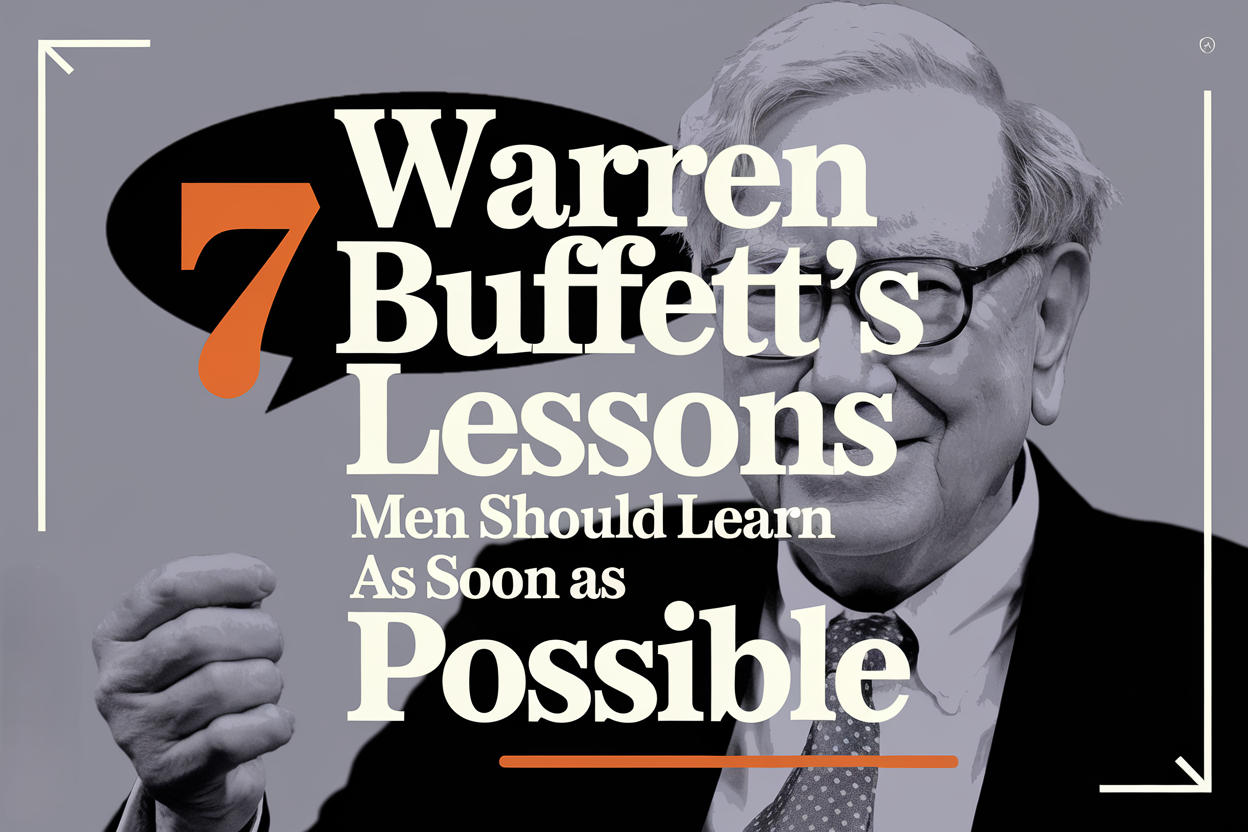Warren Buffett, often called the “Oracle of Omaha,” has amassed a fortune of over $164.2 billion through disciplined investing and business skills. Yet his most valuable offerings aren’t stock tips but the wisdom he’s shared throughout his remarkable career spanning more than seven decades.
While his investing prowess is legendary, Buffett’s straightforward philosophy on life, work, and relationships contains universal truths that transcend finance. These lessons are particularly valuable for men looking to build wealth and a life of meaning and integrity.
Whether you’re just starting your career or well-established, these seven principles from one of history’s most successful investors can help guide your decisions in business and life. Here are Warren Buffett’s seven life lessons men should learn as soon as possible for a more successful life.
1. Invest in Yourself First
“The most important investment you can make is in yourself,” Buffett has repeatedly emphasized throughout his career. While most know him for his stock market wisdom, he believes personal development yields the highest returns.
Buffett himself is a testament to this principle. Early in his career, he took a public speaking course after realizing that his fear of public speaking would limit his potential. He credits this single investment in himself as transformative.
Buffett spends about 80% of his workday reading and thinking—continually expanding his knowledge base and sharpening his mind. His education didn’t stop with his degrees from the University of Nebraska and Columbia Business School. He consistently pursued knowledge under mentors like Benjamin Graham and Philip Fisher, whose investment philosophy shaped his approach.
The message is clear for men looking to apply this principle: prioritize skills that can’t be taken away from you. Buffett suggests that improving your communication abilities could increase your value by 50% in your career. Whether through formal education, developing a craft, improving physical health, or honing soft skills, your investments in yourself compound over time and can’t be taxed or taken away.
2. Reputation is Your Most Valuable Asset
“It takes 20 years to build a reputation and five minutes to ruin it. If you think about that, you’ll do things differently.” This insight reflects Buffett’s understanding that integrity isn’t just morally correct—it’s a business advantage.
When Buffett stepped in as interim chairman of Salomon Brothers during a 1991 bond trading scandal, he told employees: “Lose money for the firm, and I will be understanding. Lose a shred of reputation for the firm, and I will be ruthless.” This wasn’t empty rhetoric—Buffett has walked away from potentially profitable deals when they didn’t meet his ethical standards.
The Berkshire Hathaway acquisition strategy relies heavily on reputation. Business owners often choose to sell to Berkshire even when offered higher bids elsewhere, knowing Buffett will honor his word and preserve their company’s legacy.
For men building careers or businesses, this lesson underscores that reputation acts as a form of compound interest—it builds slowly but creates enormous value over time. One ethical lapse can erase decades of trust, making reputation protection ethical and practical.
3. Choose Your Associates Wisely
“It’s better to hang out with people better than you. Pick out associates whose behavior is better than yours, and you’ll drift in that direction.” Buffett’s 60-year business partnership with Charlie Munger exemplifies this principle—a relationship that multiplied both men’s success through complementary strengths and shared values.
Buffett surrounds himself with individuals who challenge his thinking and uphold high ethical standards. He advises people to select friends and colleagues who exhibit the qualities they wish to develop. This isn’t just philosophical wisdom—research suggests that our social circles, especially our closest associates, significantly influence various aspects of our lives, including health habits, income levels, and even beliefs. This aligns with Jim Rohn’s idea, “You are the average of the five people you spend the most time with.”
Building your network means strategically evaluating who influences you daily. It’s not about calculating relationships but recognizing that our environments shape us profoundly. By intentionally building relationships with people who demonstrate integrity, discipline, and wisdom, you naturally elevate your standards and opportunities.
4. Live Below Your Means
“Do not save what is left after spending, but spend what is left after saving.” Despite being one of the world’s wealthiest individuals, Buffett still lives in the same Omaha house he purchased in 1958 for $31,500. He drove the same car for years until his daughter convinced him it had become embarrassing, and he’s famous for his modest McDonald’s breakfasts.
This disconnect between wealth and consumption stems from Buffett’s understanding that financial peace and freedom come from spending less than you earn—regardless of income level. He advocates saving before spending rather than trying to save whatever remains after expenses.
For men at any life stage, this principle offers a path to financial success through disciplined habits rather than income alone. Avoiding lifestyle inflation as earnings increase creates the capital necessary for investment and future freedom. This doesn’t mean living miserly—Buffett spends generously where he finds value—but rather rejecting conspicuous consumption that brings little lasting satisfaction.
5. Time is Your Most Precious Resource
“The difference between successful people and really successful people is that really successful people say ‘no’ to almost everything.” This powerful insight reveals Buffett’s understanding that time is the ultimate non-renewable resource.
While most people scatter their attention across countless opportunities, Buffett ruthlessly protects his calendar, understanding that each commitment represents time that can’t be recovered or redirected.
Buffett’s approach to time management manifests in his famously uncluttered schedule, with large blocks dedicated simply to reading and thinking. This deliberate creation of space allows him to make better decisions and spot opportunities others miss. His patience is legendary—he’s comfortable sitting on billions in cash, sometimes for years, waiting for the right investment rather than forcing action for the sake of movement.
This principle extends far beyond investing to all areas of life. For men at any career stage, learning to value time properly means understanding that saying “yes” to one thing automatically means saying “no” to everything else.
Buffett made over 99% of his wealth after turning 50, demonstrating that compounding—whether of money, knowledge, or relationships—delivers its most significant rewards to those patient enough to focus on fewer things and give themselves the time to develop fully.
6. Make Decisions Based on Value, Not Price
“Price is what you pay. Value is what you get.” This fundamental insight drives Buffett’s investing approach and extends to all life decisions. When Buffett purchased See’s Candies in 1972, he paid a premium price that initially seemed steep, but the company’s strong brand and customer loyalty created extraordinary returns over decades.
This principle applies to everything from education to relationships. The cheapest option rarely delivers the best long-term value, while quality investments often justify premium costs through durability and performance. For men making major life decisions, this means evaluating opportunities based on long-term returns rather than immediate expenses.
Whether choosing between jobs, homes, education, or even relationships, focusing on underlying value rather than surface-level price leads to better outcomes. Quality endures, while bargains often fade quickly—a lesson that applies far beyond the balance sheet.
7. Cultivate Emotional Intelligence
“If you can’t control your emotions, you can’t control your money.” Buffett considers his temperament, not his intellect, his most significant advantage. When markets crash, and others panic, Buffett typically sees opportunity—a mindset that’s enabled some of his most profitable investments during economic downturns.
His ability to think independently against market sentiment and avoid emotional decision-making creates a significant competitive advantage. Buffett famously advised investors to be “fearful when others are greedy, and greedy when others are fearful”—a principle requiring emotional self-regulation.
Developing emotional intelligence creates similar advantages for men navigating careers, relationships, and personal challenges. By recognizing emotional triggers, managing stress effectively, and making decisions based on principles rather than impulses, you gain control over outcomes that elude those driven by emotional reactivity.
Conclusion
Warren Buffett’s wisdom endures because it’s been tested through bull and bear markets, personal challenges, and decades of business decisions. While his specific investment principles might not translate to every situation, these seven life principles offer a roadmap for men seeking success defined by more than just financial metrics.
Buffett said, “In the business world, the most successful people are those who are doing what they love.” By investing in yourself, guarding your reputation, choosing wise associates, living below your means, valuing time, focusing on actual value, and mastering your emotions, you build wealth and a life of meaning and integrity. The greatest lesson from Buffett may be that the same principles that build financial success also create a well-lived life.





